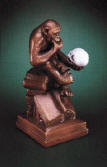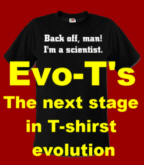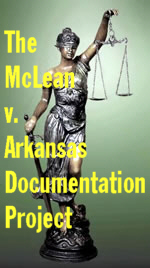
Troy Britain's
Creation/Evolution
Locus
Consider helping me defend science education by making a donation.
Thank you.
Antievolutionists'
Use of Quotations from Minority Or Fringe Scientists
By Troy Britain © 2004
![]()
![]() ne of the several
ways in which antievolutionists abuse their quote mining tactic, is to quote
from scientists who either hold a minority view, or sometimes from a scientist
whose views are down right nutty. They present them as if the views they
represent should be given equal weight to the consensus view held by the vast
majority of scientists. Often these fringe scientists do not have directly
relevant backgrounds to the subject they are being quoted on. Moreover the
actual views of these fringe scientists often clash not only with mainstream
science but also with those of the antievolutionists who are quoting them.
ne of the several
ways in which antievolutionists abuse their quote mining tactic, is to quote
from scientists who either hold a minority view, or sometimes from a scientist
whose views are down right nutty. They present them as if the views they
represent should be given equal weight to the consensus view held by the vast
majority of scientists. Often these fringe scientists do not have directly
relevant backgrounds to the subject they are being quoted on. Moreover the
actual views of these fringe scientists often clash not only with mainstream
science but also with those of the antievolutionists who are quoting them.
The late Sir Frederick Hoyle is a good example of this. Hoyle, who by most accounts was a brilliant astronomer (he, sarcastically, coined the term "big bang", a theory which he rejected), wandered out of his field to write several books expressing skepticism about various parts of evolutionary theory and promoting his own unique ideas on how the history of life on earth should be explained. It is these works that antievolutionists regularly mine for quotes to support their arguments.
What antievolutionists do not explain to their audience is why an astronomer's opinion (even a famous one) should carry any particular weight in discussions about biology and paleontology, or exactly what Hoyle's alternative explanation for the history of life is.
The
antievolutionists penchant for quoting Hoyle (and others like him) is really
little more than an attempt at an argument from authority. The idea being that
these are respected scientists with PhD's so what they say on any area of
science must be important. Antievolutionists often preface their quotes of Hoyle
with honorifics such as "leading scientist" (Vance 2001: 64 &
765); "famous evolutionary astronomer" (Morris & Parker 1987: 48);
or even "Sir Fred Hoyle, famous British mathematician and astronomer"
(Sunderland 1988: 57), in order to further build up his supposed authority in
the eyes of their audience.
Of
course the fact that Hoyle was an astronomer certainly did not disqualify him
from having an opinion on other areas of science, nor did it disqualify him from
possibly making valuable contributions to them. There have been non-biologists/paleontologists (and even non-scientists) who have done so in the
past.
However the mere fact that he held a PhD, and was noted in astronomy, did not make him any better qualified to comment on these fields than any other non-biologist/paleontologist. Unless it can shown that Hoyle had distinguished himself by demonstrating a mastery of these fields (and I submit that he did not do this) and had been acknowledged by scientists in those fields as having done so (despite his lack of formal background in them), then they may just as well quote their own views on evolution as those of Hoyle.
Antievolutionists also do not usually talk about what Hoyle's alternative views were. I suspect that the reason behind this omission is that they themselves consider them to be at the very least unacceptable, and that they must realize that if they told their audience about his ideas, then their attempt to establish Hoyle as an authority figure would come crashing down.
Antievolutionists know that their audience is largely made up of those who wish to have their pre-existing skepticism regarding evolution confirmed, and that they will find comfort in having a "leading scientist" quoted as agreeing with their views. However if they were to tell their audience that this "leading scientist" also believes that insects might come from outer space; that they may be as intelligent as human beings but are hiding this fact us (Hoyle & Wickramasinghe 1981: 127-128); and that the changes in life on earth are the result of a (natural) alien intelligence which has been raining mutation-causing viruses upon the earth throughout geologic time; then their audience may no longer find the company to be quite so good.
Case in point, I was personally present when an acquaintance of mine asked
Dr.
Duane Gish of the Institute for Creation
Research about Hoyle's alternative views immediately after Gish had used
this tactic in a talk he gave to students at
Azusa
Pacific University (2/11/1999). Gish's response was something to the effect
that Hoyle's alternative ideas were "silly". But in front of the students he was a
"Sir Fred Hoyle, the famous British astronomer".
This
sort of tactic while perhaps not as blatantly dishonest as quoting mainstream
scientists out of textual context is certainly further evidence of the lack of
intellectual integrity which pervades the antievolution movement.
References
Ferrell, Vance (2001) The
Evolution Cruncher: Scientific facts which annihilate evolutionary theory
Hoyle, Fred &
Wickramasinghe, Chandra (1981) Evolution from Space: A theory of cosmic
creationism, Chap. 8, "Insects from space?"
Morris, Henry M. &
Parker Gary E. (1987) What is Creation
Science?
Sunderland, Luther D. (1988) Darwin's Enigma
Related Links
Fred Hoyle, Cosmologist and Crank




